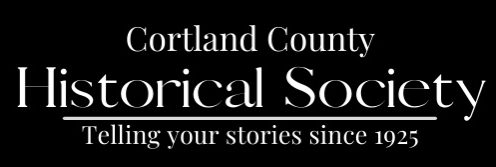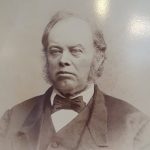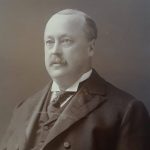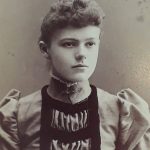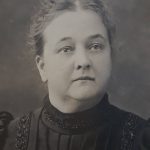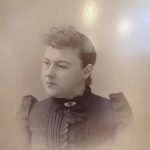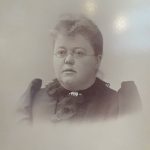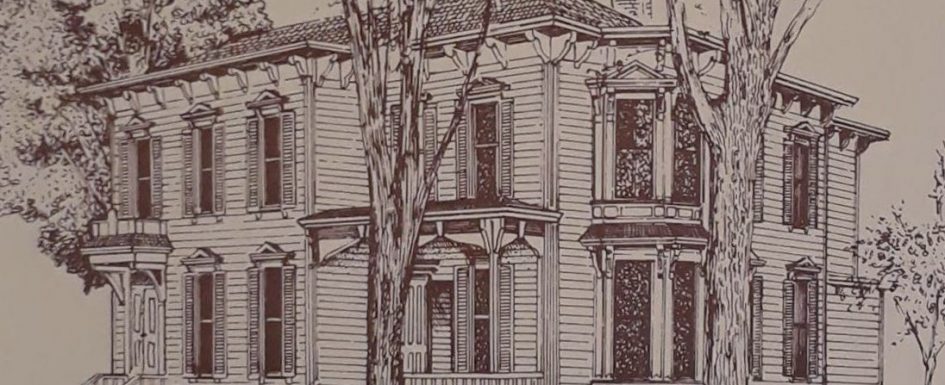
Meet the Suggett Family
Do you live in a Suggett house?
The Suggett House Museum is where we house our many artifacts and where we tell the stories of Cortland County’s past to our visitors. To tell you about the Suggett Family, first I will share how we came to be located in the former Suggett home. As the great-grandson of James and Jane Suggett, John Chester Birdlebough was the last heir in this branch of the Suggett family. He inherited the house when his last aunt died. It was Mr. Birdlebough who gifted the house to the Cortland County Historical Society. Before that, CCHS was housed at both the library and the county courthouse. The house became available at a time when we had outgrown our space at the courthouse, so it was a welcome gift. John Chester Birdlebough asked only that we call it the “Suggett House.”
The bulk of my knowledge about the Suggett family comes from a small booklet written by former CCHS director, Leslie O’Malley and Bruce Buckley. Most information here is from that booklet. We have a wide variety of artifacts, papers, and photos in the collection that tell the story of the Suggett family.
James and Jane Suggett immigrated to America from England in 1851. They landed in New York on May 29, and their first surviving child, a daughter named Rosanna, was born just three weeks later. The Suggetts had up to ten children, but only four lived to adulthood. You can see on the little family tree that there are up to four unnamed children, this is simply because there is not enough information to know more. The Suggett family settled in Cortland, perhaps to be near other immigrants from Yorkshire, where they hailed from.
In England, James Suggett had been apprenticed to a weaver as a child, but he abandoned weaving and worked as a laborer in the United States. He worked hard at many things, including digging wells. In 1861, the 76th Regiment was training at the fairgrounds in Cortland, and a small group of men were working to devise a closed well. They came up with something that worked, but James (who was part of the group) continued to improve the design on his own. In 1862, he made some improvements that made a huge difference in the functionality of the well and he applied for a patent on March 29, 1864. People in Cortland paid a $25 fee for one of his wells. There was considerable litigation over the driven well, and it is a complex topic, but in the end, Suggett’s improvements were recognized and he was able to sell territorial patent rights. In 1865, he made $30,000. In the years from 1865-1868, Suggett’s income was over $50,000 a year. He used his money to acquire land which was later sold for a great profit. There was also a construction company which was in his wife Jane’s name which built houses on the land James owned. (This was a very unusual practice at that time since women did not typically own property or run businesses.) The lots were divided into ½ acre or fewer lots and sold with a home ready to move into. Were they the first housing developments in Cortland? Perhaps! The Suggetts had a team of laborers who built these homes; brother-in-law Thomas Ellsworth was a carpenter, Robert Dalton was a mason, and a fellow with the surname Merrick painted and papered the finished homes. Houses sold for $300-$1200 each.
Twins Cora and Flora Suggett were born in 1861 and lived in the Suggett family home for their entire lives. The twins were enrolled in the Normal School at twelve years old, but Cora dropped out the following year after many absences. She was the homebody of the Suggett family. She was more reclusive than the other family members, and she did not finish school. There are indications that she had physical ailments that contributed to her retiring personality. However, it seems she was a great cook–great-nephew John Chester Birdlebough fondly remembered his Aunt Cora’s cooking skills. Flora Suggett continued at the Normal School and trained to become a teacher. She graduated in 1882 and is listed in the city directories as a teacher as late as 1891. James and Jane Suggett died in 1890 and 1891, so it is probable that Flora had to assume the responsibilities of handling the family farm and business.
The Suggett twins were not necessarily well-liked within the community. There is at least one story about them attending church without first cleaning up after barn chores. There was a large garden in back of the Suggett’s house, and both Cora and Flora would chase children off the property when they tried to cut across their backyard. At the end of their brother John’s life, when he was too ill to come downstairs to receive visitors, the twins would take visitors up the servant’s staircase to save the carpet on the front stairs. It was told that John offered a $20,000 dowry to any man willing to marry one of his sisters!
Neither Cora nor Flora would ever marry. In fact, the only sibling of the four to marry was Rosanna. Rosanna married Charles Peckham, a stone worker, and marble polisher. Not much is known about Rosanna, but she attended Cortland Academy from 1865-1866 and did not graduate. She and her husband lived at 81 Homer Avenue, just down the street from her parents, in a home built by her father. It is said that her family was against her marriage to Charles Peckham because his mother had died at the county farm while suffering from a “weak mind” in 1887. As a matter of fact, Charles spent time at both the county farm and Utica State Hospital in 1888 when he was declared “insane.” He was discharged in 1889 as cured. Since his admittance was so close to the death of his mother, perhaps he was simply grief-stricken.
Rosanna and Charles would only have one child, a daughter named Gertrude. She was born in 1873 and graduated from the Cortland Normal School in 1891. She taught school for seven years. She married C. Frank Birdlebough in 1892. It is interesting that she continued to teach once she married because that was often not the case. Typically when a woman married, she stopped teaching. Gertrude and her husband had only one child, a son named John Chester Birdlebough. C. Frank Birdlebough died in 1897, leaving behind his son and wife, who followed him to the grave in 1904 when she died from tuberculosis. Ten-year-old Chester, as he was called, was raised by his grandmother Rosanna.
The Suggett’s only surviving son, John, was born in 1853 along with a twin. We don’t know the name of his twin so it is probable the twin died at birth. John would attend Cortlandville Academy and the Normal School where he would graduate in its first graduating class in 1871. As a teenager, John kept his father’s financial ledgers and took care of his business correspondence. James Suggett did not complete his education, so having John to rely on must have been a tremendous help.
John started out as a surveyor and civil engineer. He attended Cornell University for a short time but came home because his father was battling typhoid fever. He then studied law under local attorneys Mordarent M. Waters and Hiram Crandall and was admitted to the New York State bar in 1876. He began his law practice in Cortland with Benjamin Wright. Their office was over 10 Main Street. He would later practice in New York City.
Perhaps due to the troubles his father had experienced with the driven well patent, John came to specialize in patent law. R. Holland Duell took John under his wing and used his influence to help John secure the position of U.S. Commissioner for the Northern District of New York. (Note: R. Holland Duell was a transplant to Cortland who was appointed U.S. Commissioner of Patents and was the one who signed the patent for Alexander Graham Bell’s invention—the telephone. He also served two terms in Congress, 1863 and 1871.) John Suggett was a brilliant patent attorney, and some of his clients included Cortland Wagon Company, the Smith Typewriter Company in Syracuse, and Elmer Sperry. John enjoyed traveling, and on one trip to England, he was asked to supply expert testimony in patent law in typewriter patent cases. He was one of the only Americans to be asked to speak before the House of Lords and this opportunity presented itself because he had previously defended Alexander T. Brown’s patent suit in the United States Supreme Court.
John Suggett was a smart and curious man. Math and science were his passion, and he had a collection of mathematical instruments that was extraordinary. The collection was donated to the University of Pennsylvania’s Civil Engineering Department in 1899. John was keenly interested in education. It is said that he would sit on the porch of the Suggett home and ask passing children math and science questions. Although he remained a bachelor, he was passionate about education for children and was a member of the Cortland Board of Education in the 1880s. He worked to improve the education system and as such, he drafted and secured passage of the Union School Law, the law which Cortland schools were governed under.
It was not only primary education that Suggett was interested in–he played an important part in keeping the Cortland Normal School in Cortland after the devastating fire of 1919. John had drafted and secured the passage of a law that would ensure that if a Normal School was destroyed by fire, the municipality would have the insurance coverage needed to rebuild the school in the same municipality. The Cortland Normal School WAS destroyed by fire BUT because of legislation Suggett had helped to draft and get passed, 1) the school had insurance to rebuild, and 2) the school had to be rebuilt in the same community. The reason we have SUNY Cortland here today is largely due to John Suggett’s anticipative thinking.
Another educational area that John Suggett had an impact on was in the establishment of public libraries in Cortland. Not only was Suggett a trustee of the Franklin Hatch Library, which was located at 24 East Court Street, he was also involved in establishing the Cortland Free Library. He was involved in the consolidation of the Hatch Library into the new library. He was able to convince friends to donate money to the new library, including inventors Elmer Sperry and Alexander T. Brown. John Suggett retired from law in 1908 but still helped close friends. He died in 1928 and is buried at Cortland Rural Cemetery in the family plot.
I often tell people when they tour the Suggett House that while the Suggetts were not “Wickwire wealthy,” they left a lasting imprint on the community. Between James Suggett’s driven well and real estate ventures and John Suggett’s ingenuity and resolve to assist in educational institutions within the city of Cortland, they certainly made a difference in the history of Cortland. Just because we don’t know the names of the people who came before us does not mean that their contributions did not matter. We are still reaping the benefits today of the efforts of our community leaders of the past. The next time you walk up over college hill or visit the Cortland Free Library, I hope that you think of John Suggett and his contributions to Cortland. When you drive past Suggett Park, I hope you think about the neighborhoods James and Jane Suggett helped to build. I hope that you can see the layers of the past more clearly from our stories that we share. ~Tabitha
